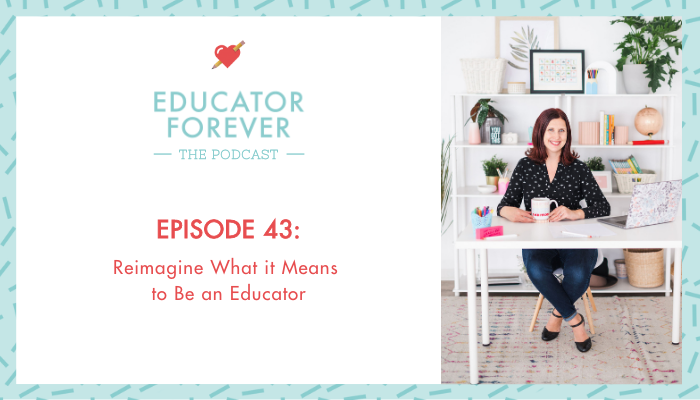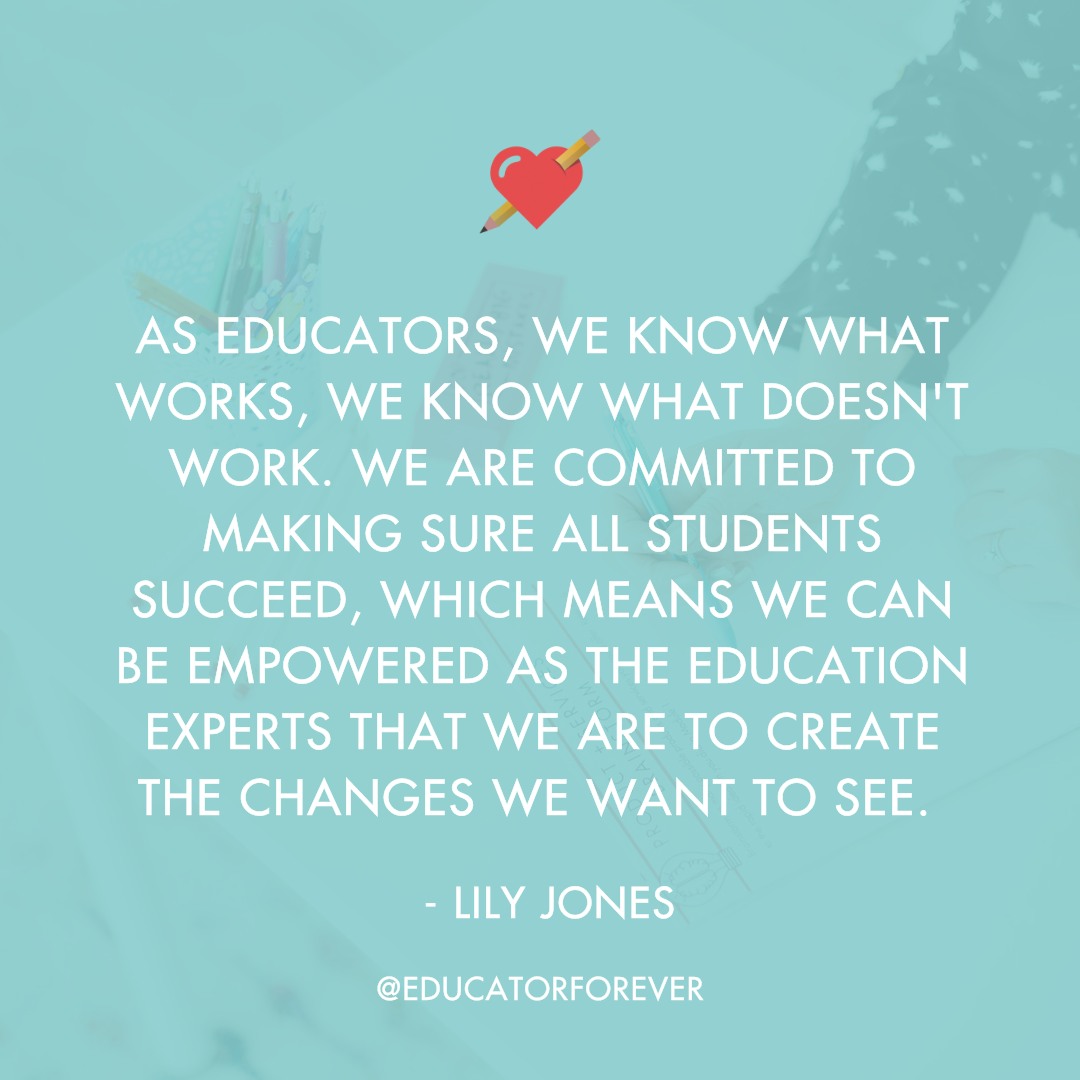Episode 43: Reimagine What it Means to Be an Educator
Whether you’re looking for flexible work in education or trying to redefine what it means to be an educator, this episode is for you! Moving beyond the classroom or just adjusting your role in education can be hard to imagine. I know it was for me. However, it can be done with a few action steps and reminders.
At Educator Forever, we implement what we call the 4 C’s. This is an ongoing process that helps educators reimagine what life can be like beyond the classroom. I disclose what each of the 4 C’s mean and how they can be applied in regard to flexible work in education. Nevertheless, no matter how you reimagine life as an educator, just make sure it’s your own. To learn more, I encourage you to join the Educator Forever Network.
Topics Discussed:
Ways to reimagine what it means to be an educator
The 4 C’s in Educator Forever on finding life beyond the classroom
How the Educator Forever Network is a commitment to the 4 C’s
Resources mentioned:
Take our FREE quiz to nail down your next best career step in education.
If you’re enjoying this podcast, please leave a rating and review on Apple Podcasts.
Related episodes and blog posts:
Read the transcript for this episode:
Today, I want to talk about reimagining what it means to be an educator. And I know when I was leaving the classroom, gosh, almost 12 years ago, at this point, I felt really lost. Because I felt that if I left teaching, I didn't really even know who I was anymore.
I thought that I couldn't leave teaching and still be an educator, it was so hard to reimagine how I could be an educator in a lot of different ways. That doesn't have to always happen as a classroom teacher. That likely if you have gone into teaching, you're going to be an educator, no matter what you do, it's in you.
And so we've done a lot of thinking here Educator Forever about how to reimagine what it means to be an educator, and really coming from a place where we believe that teachers should be the ones leading change in education. We know what works, we know what doesn't work, we are committed to making sure all students succeed, we can be empowered as the education experts that we are to create the changes we want to see.
And that with that teachers also are dealing with a lot that often we need to reimagine what it means to be an educator, because we're dealing with unhealthy school environments and unhealthy practices. And it gets to a point sometimes where you have to make a decision, if you're going to stay in that unhealthy environment or if you're going to reimagine what that means to you.
This doesn't always have to mean leaving classroom teaching, it could mean doing some work on the side, changing schools, advocating for better conditions, it can look a lot of different ways, but recognizing teachers deserve the time and space to heal from unhealthy school environments and practices. And building that time and for you if that feels relevant to you.
Only after that, you know really rooting into our expertise, really thinking about what system we exist within, then we can be empowered to pursue flexible career pathways and really expand our impact and build more sustainable and joyful lives.
So I want you to think about all of this when reimagining what it means to be an educator. And here at Educator Forever, we have a framework of four C's that we take teachers through when reimagining what it means to be an educator. This is a process. It's not something where it's like I'm done. It's constantly something that even now I'm always reimagining what I want to do next in education.
So the four C's I'll take you through which really will help you reimagine what your life as an educator can look like. The first C is clarity. And this sounds easy, but it's hard getting clear on really what our realities are. How much money do you need to make? What do you want to do in your day to day life? Do you want to go into schools? Do you want to stay home with your child or an elderly relative? What is your reality?
And share your story is also part of getting clarity. Get clear on what you've learned as a teacher, what you've experienced what you want to take forward, what you want to not do ever again. And really as you do that, unpack the impact of a dysfunctional education system. Get clear on what you believe about teaching where your heart is, what you want to change, what you want to do, and what you don't want to do anymore.
I always give the example of standardized testing. You know, I am not a fan of standardized testing. And I think that it really should be completely out done with, gotten rid of, or at least the very least, totally revamped. And so with standardized testing, you might be like, alright, I never want to deal with that, again, great, amazing, you don't have to.
Or you might lean into that if you're somebody like me who feels passionate against it, you know, maybe you would start creating more holistic assessments or work for organizations focused on assessing students in more well rounded, multi dimensional ways. So sometimes the things that really frustrate us are actually the things that we might want to lean into.
And those things when we unpack the impact of a dysfunctional education system are also the things that we might want to change. You don't have to you know, if you're like, I really just never want to deal with paperwork again. Cool. You don't have do that.
So that first C spend some time in and it's a cycle, you know, as I go through these four C's, I want you to think about this as an ongoing process, that you're going to get clarity. And then you're going to come back a few months later and be like, Alright, I think I want something else, I'm going to get clarity again. It's an ongoing process.
So the second C is confidence. Really stepping into your knowledge and experience as the education expert that you are. And I guarantee you as a teacher, you know more about education than most people. And we're often made to feel like we're just quote unquote, a teacher. And we're so much more. And even if it was just a teacher, like a teacher is an amazing, complex, challenging job. But we do so much more on top of that, too.
So with confidence comes shifting your mindset, really seeing your skills in a different light, seeing how they can transfer to other arenas, other areas, other jobs. And with that, really focusing on your wellness, not recreating the frantic pace of being a classroom teacher.
But knowing that you can slow down, you can build a more sustainable life, a lot of that has to do with confidence, actually, because you can feel confident in your ability to do so.
Not that you have to fit in the system that's burning you out. So first C is clarity, then confidence, and then we move into community. So community is so important. If you're trying something new, it can feel totally scary and unknown, rightfully so. But if you're around other people who have done similar things, or wanting to do similar things, it can be so much better.
So in community, you can gain insight from others, learn from what they're doing. You know, in our Educator Forever network community, we have people sharing, hey, I got this job with this organization, they're looking for more people do you want to come join them, and building connections within the community.
Or, Hey, I took this course it was amazing. Let's recommend it to other people, really building that community that supports and uplifts everyone.
In community too you can hold space for possibilities. And really don't underestimate the importance of exploring, dipping your feet in, trying things out, hearing other people talk about things and noticing how it feels to you will get you clarity, you know, again, they all fit together these four C's. In community too, you can feel supported to dream, explore, and create and all are important.
Giving yourself a chance to step back and really think about what you want to create, then exploring how to do it and actually creating it. All of that happens with the accountability and support of community.
So we've talked about clarity, confidence, and community. And the last C that is key when reimagining what it means to be an educator is commitment. And with commitment, you're saying I'm gonna do this, I'm gonna find a way, I have a vision of what I might want to explore. And now I'm gonna commit to doing it.
So then you can take intentional steps towards your goals, and really drive change in education. And with this comes leaning into your role as a lifelong learner. As you step out of the classroom, or explore opportunities beyond the classroom, you likely are going to find things that you don't know how to do yet. And I want you to think about that word yet.
You are a teacher, and you're an expert in learning. So anything you don't know how to do yet, you can figure it out. It takes commitment, though, and clarity.
So let's say you want to become a curriculum developer, but maybe you've never really written curriculum in a way that other people could follow easily. And so you might need to think about developing those skills a little more. So you got clear on what you want to do. And then you could think about how can I develop my skills?
I could try out writing. I could take a course on curriculum development, maybe our curriculum development foundations course here at Educator Forever. You could develop a portfolio and try it out and learn through doing it. You could work with a partner to get feedback on each other's work. So really thinking about what do you need to learn?
And along with that, you know, maybe it's curriculum framework, so or maybe it's how to talk about your educational philosophy and how that fits into the curriculum you create. Anything you don't know how to do, you can learn. So committing to what that next goal of yours might be, and then thinking strategically about how you're going to get there.
So to recap, to reimagine what it means to be an educator, I suggest you follow these four C's: clarity, getting clear on what you want, confidence, building that confidence up, community, being a part of a supportive community, and commitment, taking action towards your goals over and over and over again.
I love that here at Educator Forever we have our Educator Forever Network, which is all about these four C's. We really take you through each of these in a cycle over and over and over again, to support folks to reimagine what it means to be an educator, to find work beyond the classroom, to get clear on what you want, to get clear on how to create job applications or resumes and cover letters that actually land those jobs.
If you're interested in joining us, I'll put a link in the show notes and we'd love to have you try it out.


